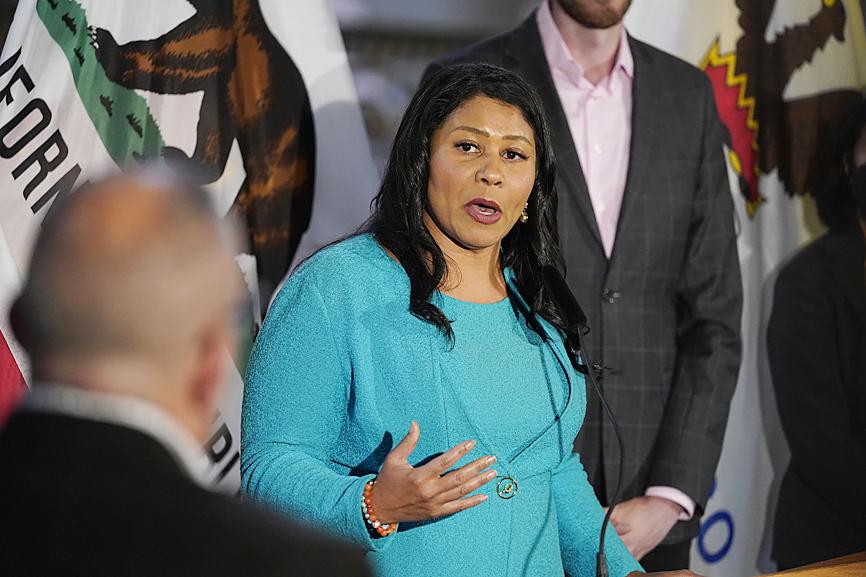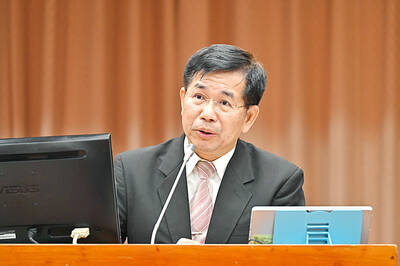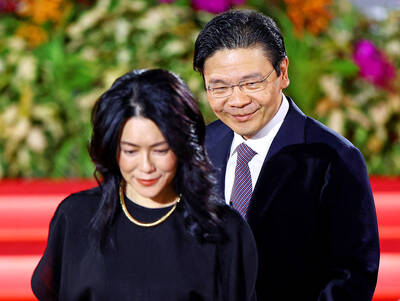The mayor of San Francisco announced a state of emergency on Thursday over the growing number of monkeypox cases, allowing officials to cut through red tape and fight a public health crisis reminiscent of the AIDS epidemic that began devastating the city in the 1980s.
“We are at a very scary place. And we don’t want to be ignored by the federal government in our need. So many leaders of the LGBT community have also, weeks ago, asked for additional help and support and assistance,” San Francisco Mayor London Breed said.
The city is in “desperate need of vaccines,” she added.

Photo: AP
The declaration, which takes effect on Monday, was welcomed by gay advocates who have grown increasingly frustrated by what they called San Francisco’s lackluster response to a virus that so far has affected primarily men who have sex with men, although anyone can get infected.
“San Francisco was at the forefront of the public health responses to HIV and COVID-19, and we will be at the forefront when it comes to monkeypox,” said state California Senator Scott Wiener, a Democrat who represents the city. “We can’t and won’t leave the LGBTQ community out to dry.”
The city has 281 cases out of about 800 in California and 4,600 nationwide, according to the San Francisco Department of Public Health.
A national shortage of vaccines has resulted in people waiting in line for hours for scarce doses, often to be turned away when the shots run out.
Members of the LGBTQ community expressed anger and frustration at a city hearing last week, saying they were relying on social media because the San Francisco public health department had not dispensed basic information on testing or vaccine availability.
San Francisco Supervisor Rafael Mandelman criticized the department, saying it was unclear why it could not staff phone lines, especially after telling people to call those phone numbers for information, while the San Francisco AIDS Foundation was able to quickly staff a monkeypox information hotline.
The organization also has a waiting list for people wanting the vaccine, unlike the public health department, which is asking people to wait in line.
After attending the San Francisco Pride weekend last month, Tom Temprano, 36, got a notification that at least one other attendee had tested positive for monkeypox. He called four numbers that local health officials provided in an effort to get vaccinated, but no one answered. He left voice messages.
“I waited and I waited and I waited,” Temprano said.
There is “growing concern, really, about our safety, given that we were further and further out from an exposure,” he said
On July 8, two weeks after being potentially exposed to the virus at the Pride event, and monitoring gay social media networks all the while, he learned through an Instagram post that a vaccine drop-in clinic was being held at San Francisco General Hospital. Temprano sent messages to about six acquaintances and rushed over.
He waited with hundreds of other people in a line that snaked into the street and halfway down a block. After waiting for more than three hours, Temprano got his first dose of the vaccine. One of his friends stood in line four times before he was able to get the shot.
Temprano was scheduled to get his second dose next week, but that was canceled. With vaccines in short supply, city officials have opted to prioritize administering first doses. He is frustrated that authorities have taken so long to respond, and noted they did so after LGBTQ politicians in his community raised their voices.
“I think the saddest thing is there are people who are getting monkeypox now who tried to get that vaccine over the last month-and-a-half and couldn’t get one, who are sick and are in pain and are going to be out of work potentially for two to six weeks,” he said.
Wiener had urged local and state officials to declare a health emergency, which he said would give the city and counties greater flexibility to respond to the growing outbreak. For example, it would streamline getting test results to people and allow a broader array of providers to perform vaccinations.
Wiener, who is gay, also noted the parallels to the AIDS crisis in San Francisco.
“I feel like this is like deja vu, that once again, gay men are getting attacked and demonized and blamed as we get sick, and that we can never tolerate that,” he said.
In the early 1980s, the US government was slow to react as the AIDS epidemic ravaged gay communities in San Francisco and elsewhere. Groups like ACT UP emerged to push for action to fight AIDS. That struggle has echoes today.
Despite the problems with vaccine supply, federal officials said that the country’s monkeypox outbreak can still be stopped, amid worries that the US has missed the window to contain the virus. The monkeypox virus spreads through prolonged skin-to-skin contact, which includes sex, kissing, breathing at close range, and sharing bedding and clothing, the public health department said.
Health officials are asking people who could be at risk to cover exposed skin when out in crowds and to watch out for symptoms, such as fever, blisters and rashes.
The WHO over the weekend declared monkeypox a global emergency.

The International Industrial Talents Education Special (INTENSE) Program to attract foreigners to study and work in Taiwan will provide scholarships and a living allowance of up to NT$440,000 per person for two years beginning in August, Minister of Education Pan Wen-chung (潘文忠) told a meeting of the legislature’s Education and Culture Committee yesterday. Pan was giving an update on the program’s implementation, a review of universities’ efforts to recruit international students and promotion of the Taiwan Huayu Bilingual Exchanges of Selected Talent (BEST) program. Each INTENSE Program student would be awarded a scholarship of up to NT$100,000 per year for up to

BASIC OPERATIONS: About half a dozen navy ships from both countries took part in the days-long exercise based on the Code for Unplanned Encounters at Sea An unpublicized joint military exercise between Taiwan and the US in the Pacific Ocean last month was carried out in accordance with an international code, the Ministry of National Defense (MND) said yesterday. According to a Reuters report citing four unnamed sources, the two nations’ navies last month conducted joint drills in the Western Pacific. The drills were not made public at the time, but “about half-a-dozen navy ships from both sides, including frigates and supply and support vessels, participated in the days-long exercises,” Reuters reported, citing the sources. The drills were designed to practice “basic” operations such as communications, refueling and resupplies,

‘MONEY PIT’: The KMT’s more than NT$2 trillion infrastructure project proposals for eastern Taiwan lack professional input and financial transparency, the DPP said The Democratic Progressive Party (DPP) caucus yesterday said it would ask the Executive Yuan to raise a motion to oppose the Chinese Nationalist Party (KMT) caucus’ infrastructure proposals and prepare to file for a constitutional interpretation if the KMT-dominated legislature forces their passage. The DPP caucus described the three infrastructure plans for transportation links to eastern Taiwan proposed by the KMT as “three money pit projects” that would cost more than NT$2 trillion (US$61.72 billion). It would ask the Executive Yuan to oppose public projects that would drain state financial resources, DPP caucus secretary-general Rosalia Wu (吳思瑤) said. It would also file for

Singapore yesterday swore in Lawrence Wong (黃循財) as the city-state’s new prime minister in a ceremony broadcast live on television after Lee Hsien Loong (李顯龍) stepped down following two decades in office. Wong, formerly deputy prime minister, was inaugurated at the Istana government office shortly after 8pm to become the second person outside the Lee family to lead the nation. “I ... do solemnly swear that I will at all times faithfully discharge my duties as prime minister according to law, and to the best of my knowledge and ability, without fear or favor, affection or ill-will. So help me God,” the